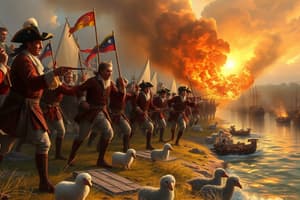Podcast
Questions and Answers
Which of the following events was a response to British taxation and ultimately fueled the American Revolution?
Which of the following events was a response to British taxation and ultimately fueled the American Revolution?
- The Age of Enlightenment
- The French and Indian War
- Bacon's Rebellion
- The Boston Massacre (correct)
The Stamp Act of 1765 was a tax imposed on American colonists that required them to pay for an official stamp on paper goods.
The Stamp Act of 1765 was a tax imposed on American colonists that required them to pay for an official stamp on paper goods.
True (A)
What was the main purpose of the Committees of Correspondence established in 1772?
What was the main purpose of the Committees of Correspondence established in 1772?
To coordinate communication and resistance among the American colonies against British policies.
The event known as the ______ led to the first military engagements of the American Revolutionary War.
The event known as the ______ led to the first military engagements of the American Revolutionary War.
Match the following events with their corresponding descriptions:
Match the following events with their corresponding descriptions:
Study Notes
Influence of the Renaissance and Reformation on the U.S.
- The Renaissance stimulated ideas of individualism and humanism, influencing the political thought and leadership frameworks in the U.S.
- The Reformation encouraged questioning of authority and traditional norms, leading to religious diversity and the promotion of freedom of conscience in America.
Christopher Columbus
- Christopher Columbus’ voyages in 1492 initiated European exploration and colonization of the Americas.
- His expeditions opened up transatlantic exchanges, impacting trade, culture, and the demographic landscape of the continent.
England in the Mid 1600s
- The mid-1600s saw the English Civil War, which resulted in conflicts between monarchy and parliamentary power, setting precedents for democratic governance.
- Political and religious turmoil in England encouraged dissent and migration to America, laying groundwork for revolutionary sentiments.
The Age of Enlightenment
- Enlightenment thought emphasized reason, science, and individual rights, influencing the Founding Fathers and shaping the ideology of the American Revolution.
- Philosophers like John Locke advocated for natural rights and the social contract, directly informing American political principles.
Bacon's Rebellion
- Bacon's Rebellion in 1676 highlighted colonial discontent, especially among marginalized groups, and foreshadowed future colonial resistance against British rule.
- The uprising revealed tensions over land, power, and governance, influencing colonial attitudes toward authority.
The French and Indian War and The Proclamation of 1763
- The French and Indian War (1754-1763) strained British finances, leading to tax increases on the American colonies.
- The Proclamation of 1763 restricted westward expansion, causing resentment among colonists seeking new lands.
Sugar Act (1764)
- The Sugar Act aimed to reduce smuggling and raise revenue through taxes on sugar and molasses, increasing colonial frustration over taxation without representation.
Stamp Act (1765)
- The Stamp Act imposed a direct tax on printed materials, igniting widespread protests and the formation of the Sons of Liberty, advocating for colonial rights.
Declaratory Act (1766) and Townshend Acts (1767)
- The Declaratory Act reaffirmed British authority to tax and legislate for the colonies, heightening tensions.
- The Townshend Acts introduced taxes on everyday goods, prompting boycotts and increased resistance among colonists.
The Boston Massacre (1770)
- The Boston Massacre resulted in the deaths of five colonists, fueling anti-British sentiments and rallying revolutionary fervor.
Committees of Correspondence (1772)
- These committees facilitated communication among colonies, enhancing coordination in the resistance against British policies.
Tea Act (1773)
- The Tea Act granted the British East India Company a monopoly on tea sales, leading to protest actions such as the Boston Tea Party.
Intolerable (Coercive) Acts (1774)
- A series of punitive measures intended to quell colonial resistance post-Boston Tea Party further united the colonies against British rule.
The First Continental Congress (1774)
- The Congress brought together delegates from various colonies to discuss grievances against Britain, signaling a move toward unified action.
The March to Concord (April 1775)
- The march aimed to seize colonial military supplies, leading to confrontations that marked the start of armed conflict in the Revolutionary War.
The Olive Branch Petition (July 1775)
- This petition expressed a desire for peace and reconciliation with the Crown, emphasizing a strong but hopeful colonial stance before escalation into war.
July 4, 1776
- The Declaration of Independence was adopted, formally asserting the colonies’ intention to break away from British rule, grounded in Enlightenment principles of rights and governance.
Studying That Suits You
Use AI to generate personalized quizzes and flashcards to suit your learning preferences.
Description
This quiz explores significant events and influences that shaped early American history, including the Renaissance, the Reformation, and key occurrences leading to the American Revolution. Test your knowledge on pivotal moments such as the Age of Enlightenment, Bacon's Rebellion, and legislative acts that fueled colonial unrest. Dive into the historical context that laid the foundation for the United States.




